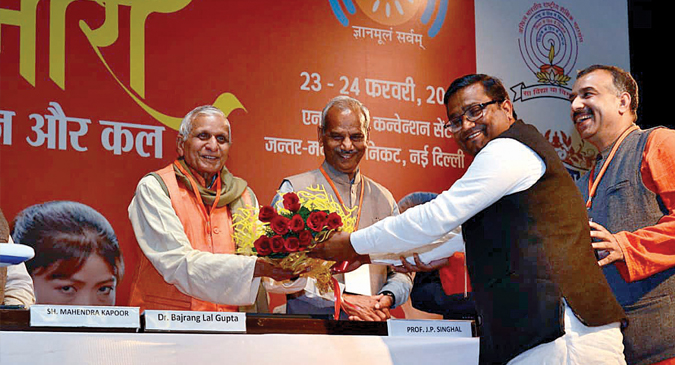“In the Vedic period, the condition of women in Bharatiya society was quite good that it needs to be rediscovered and understood. Unless we conduct academic research on the issue of how the condition of women deteriorated due to external aggression and became horrible during the colonial rule of the British, it would not be possible to find a solution to the problems of women in the contemporary Bharatiya society,” said noted academician, thinker and social activist Dr. Bajrang Lal Gupta while addressing the valedictory session of the two-day International Conference on ‘Bharatiya Women: Past, Present and Future’ at NDMC Convention Center in New Delhi. The conference was jointly organised by Shaikshik Foundation, Deshbandhu College of Delhi University and Ch. Bansi Lal University, Bhiwani from February 23 to 24, 2019.

Dr Bajrang Lal Gupt being welcomed at the function
Dr. Bajrang Lal Gupta urged the young researchers to engage themselves in scientific inquiry into the contemporary issues related to women and seek their solution in the Vedic knowledge system rather than looking towards the West. “There is no need to analyse the women related issues in Bharat from the western perspective. We should not impose western thinking on our society,” asserted Gupta. Explaining the difference between Bharatiya and Western thinking, Gupta said that in the Bharatiya social system the family is considered the smallest unit while in the western tradition individual is considered as the unit. “It is due to this basic difference in the thought process of the two traditions, here in Bharat family is at the centre of thought process while in the west the individual is at the centre,” he added.
Speaking on the occasion, noted academician Prof. JS Rajput said that there is a great need for special focus on education of women. “If the proper education for girls is ensured the condition of women in society would definitely improve,” said Rajput.
The two-day international conference was attended by 325 national and international scholars. In these conference 42 panellists presented their views. Besides 75 research papers were also presented.
There were three special sessions and nine technical sessions in the conference. The media coordinator of the conference Dr Sanjay Kumar informed that the intellectual discourse in the conference would be compiled and published for knowledge dissemination.














Comments